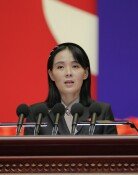Unification to be a hot potato
Fifteen Chinese power bloggers and executives from key media companies visited Korea last Sunday. It was part of a program inviting foreign correspondents hosted by the Culture, Sports, and Tourism Ministry and Korean Culture and Information Service. For a one-week itinerary, they visited Korean companies, government agencies, media outlets, and even plastic surgery clinics.
Korean Culture and Information Service invited them because they have strong power over 1.3 billion Chinese, 600 million Chinese Internet users to be more specific. Pang Xu Min has 17.41 million followers on Weibo, a Chinese version of Twitter. Hai Xia is a news anchor of CCTV, which has billions of viewers. Liangzu Xiang is the vice president of Baidu, Chinas largest portal website.
They had a meeting with the members of Hwa Byeok Ji Seong at the Korea Press Center, downtown Seoul, on Tuesday. Hwa Byeok Ji Seong is a gathering of former and incumbent Korean and Chinese journalists who were or are correspondents in China and North and South Korea. It was launched in Beijing in December 2008 for the exchanges between Korean and Chinese journalists.
Chinese journalists and power bloggers said amicably, The Korean Wave is incredibly popular in China. In the 1980s, most non-Chinese dramas used to be Japanese. Now, Korean dramas have dominated the Chinese market. Almost all Chinese young people know what Dong Bang Shin Gi and Wonder Girls, Korean singers groups, are.
Chinese had been favorable to North Korea blindly but they changed a lot over North Koreas nuclear issues today. The change was reflected in Beijings joining in the U.N. sanctions against North Korea.
They said Chinese are gradually opening their mind to a South Korea-led unification. This means that Chinese are less reluctant about it with the growing volume of exchanges between Korea and China. They also stressed that a sudden collapse of North Korea would become a disaster both to South Korea and China. If millions of refugees rush to three northeastern Chinese Provinces, the Chinese government cannot handle them.
When I said, We are all journalists, so please feel free to ask any question. We will give you answers honestly, one immediately raised a question on the U.S. forces in Korea. It was not easy to answer the question Why does South Korea, which is 37 times stronger than North Korea, allows the stationing of the U.S. forces? I said, We need the help of the U.S. because North Korea started the Korean War and is still developing nuclear weapons that can devastate the entire Korean peninsula. I also stressed that the mission of the U.S. forces is to safeguard the Republic of Korea from belligerent North Korea.
It was not easy to answer the next question, Then, they (U.S. forces) do no longer need after unification? The question implied what Chinese people think the U.S. forces stay there not only to deter North Korea but also to hold China in check. I gave them a theoretical answer that the status and roles of the U.S. forces in Korea will significantly change after unification.
They asked the question decently but they must have wanted to say, If the U.S. forces in Korea is not just for the deterrence of North Korea as you said, then it is natural that they would pull out of the Korean peninsula after unification.
In May 2008, both Seoul and Beijing elevated the bilateral relationship from the comprehensive cooperative partnership to the strategic cooperative partnership. When President Park Geun-hye visited China this year, the heads of state of both countries agreed on further developing the strategic cooperative partnership. The time draws near for cooperation in military and security and even unification, beyond economic and cultural exchanges. Then, the U.S. forces in Korea could become a hot potato. Korea needs to prepare a thorough strategy to persuade Chinese and elicit cooperation from Beijing regarding unification.







